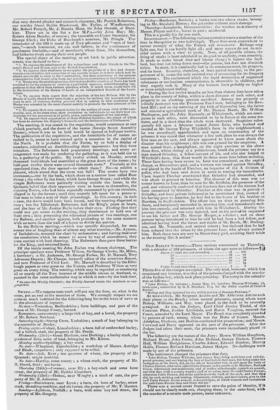SwprG.—We suppose next week will put out the fires, or,
what is the same, put an end to the mention of them. We strongly suspect we are quite as much indebted for the following long list to the want of news as to the abundance of roguery.
No date—Tottenhoe, Bedfordshire ; farm buildings, and part of the house of Mr. George Fossey, burned.
Kempston, same county ; a large rick of hay, and a hovel, the property of Mr. Robert Newland.
Saturday night—Stump Cross, Yorkshire ; a stack of hay belonging to the constable of Morley. Friday nkrtht—Colney, Lincolnshire ; a barn full of unthreshed barley, and a bullock shed, the property of life. Postle. Wednesday (23rd)—Great Bircham, near Dorking ; a barley stack, the produce of forty acres of land, belonging to Mr. Kitton.
Monday night—Spalding; a hay stack. No date—Whapload, Lincolnshire ; a workshop of Messrs. Astridge and Black, carpenters ; only supposed to be wilful. No date—Ash, Kent ; ten quartets of wheat, the property of Mr Quested ; origin doubtful.
No date—Hartlip, same county ; a wheat stack, the property of Mr. R. Goord, fired ; not bunt.
Thursday (24tb)—Coveney, near Ely ; a hay-stack and some loose straw, the property of Mr. Byddal Chambers. Wednesday (23rd)—Holton, near Wragby; a stack of oats, the pro- perty of Mr. It. Johnston.
Friday—Shernhorne, near Lynn ; a barn, six lasts of barley, straw stack, thrashing-machine, and six horses, the property of Mr. T. Masters.
Sunday—A ylsham, Norfolk; a barn, with some hay and straw, the property of Mr. Gregory. Friday—Besthorpe, Norfolk; a barley and two wheat stacks, belong- ing to Mr. Abraham Howes ; fire got under without much damage. Thursday—Longfords, Gloucestershire; the woollen manufactory of Messrs. Playne and Co., burnt in part ; accidental. This is a goodly list for one week. INCENDIAltis3L—The following curious narrative traces a number of the fires in Shropshire to two individtpds. These fires seem everywhere to savour strongly of what the French call monomania. Revenge may light one, but it can hardly light all ; and mere rogues do not do mis- chief unless with a view to profit. Now, of all possible crimes, the firing of stacks is least calculated to do good to anybody, even remotely. It tends to make bread dear and labour cheap ; it injures the land- lord, but does not bring down rent—the parson, but does not diminish tithes. In short, it is unmixedly bad in its commencement, its progress, and its issue. Insanity, therefore, at least partial insanity, in the per- petrators of it, seems the only rational way of accounting for its frequent occurrent. The excitement which the rapid destruction of organized substances or mechanism communicates, is observable in children, and they eagerly seek it. Many of the burners have probably no higher or more enlightened feeling. " During the last twelve months, no less titan sixteen fires have taken place in the county of Salop, within a short distance of each other, and property to an alarming amount sacrificed. Among the property so wilfully destroyed was the Twemrose Fox Cover, belonging to Sir Row- land Hill; and on the morning of the 13th of September last, the farms and extensive agricultural stock of Mr. Thomas Booth, Mr. William Darlington, and Mr. John Nunnerly, at Whitchurch, which are conti- guous to each other, were discovered to be in flames at the same mo- ment, and in a short time the whole were destroyed. Suspicion subse- quently fell upon a labourer named James Lear, who worked and resided at Mr. George Toing Whitfield's farm in the neighbourhood ; he was accordingly apprehended, and upon an examination of the prisoner it was stated that whenever a fire took place he was always the first man on the spot, and always appeared to know more about the disaster than his neighbours ; this was one ground for the suspicion. A man named Scott, a lamplighter, on the night previous to the above three fires, whilst sitting at a public-house, heard the prisoner say to a man named Grindley, a fellow-servant of his, and who also lodged at Whitfield's farm, that there would be three more fires before morning- These facts having been sworn to, Lear was committed, on the capital charge, to Shrewsbury gaol, and a warrant was issued against Grindley, and placed in the bands of Fletcher, an inspector of the A division of police, who had been sent down to assist in tracing the incendiaries. Upon inquiry Fletcher ascertained that Grindley had absconded, and was about to proceed to America. The absence of this man was no sooner known to Lear, than he sent for Mr. Griffiths, the governor of the gaol, and voluntarily confessed that fourteen fires out of the sixteen had been committed by Grindley. Fletcher at this time was in pursuit cf Grindley, and from private information lie ascertained that, instead of his having gone to America, he had fled to the house of his brother at Burslem, in Staffordshire. The officer lost no time in pursuing him there, and fortunately succeeded in meeting him, and immediately took him into custody, and returned with him to Whitchurch. During the journey the prisoner was very dejected, and on his arrival he requested to see his father and Mr. George Harper, a solicitor ; and Ott those persons being introduced to him he said he had been a bad fellow, and admitted having fired the farms and stacks of Mr. Booth, Mr. Darling- ton, and Mr. Nannerly, and several others ; but declared that he had been seduced into the crime by the prisoner Lear, who always assisted him. Both these men are now in Shrewsbury gaol, awaiting their trials at the ensuing March assizes."


























 Previous page
Previous page